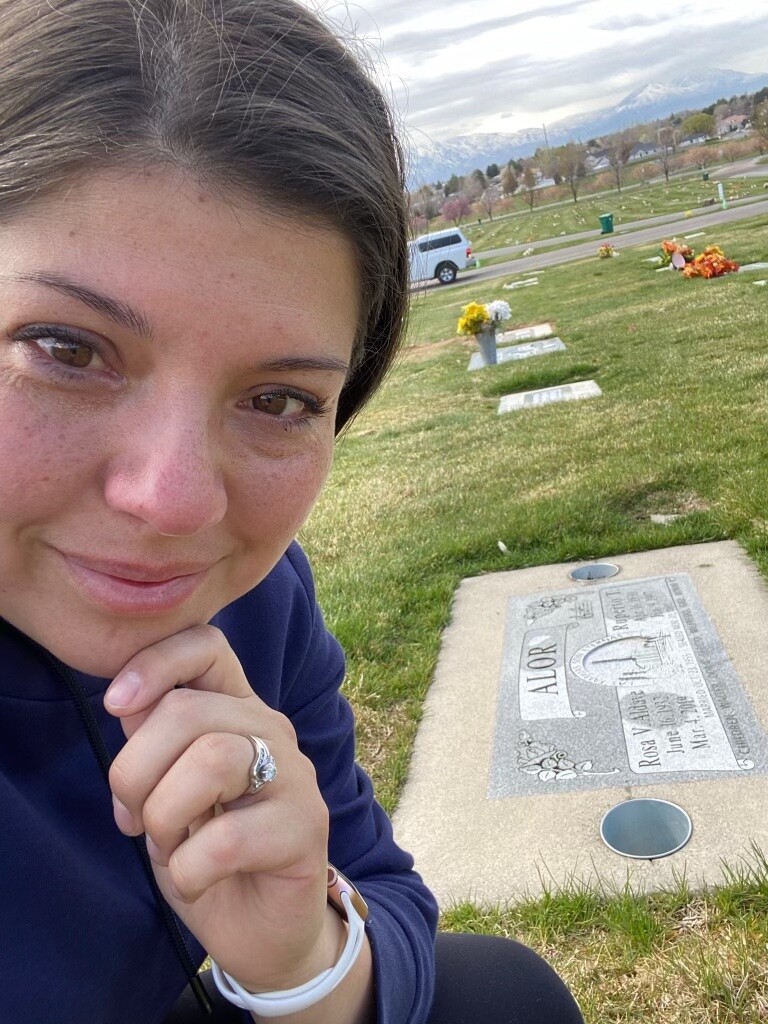The following story originally appeared on the Magnify blog as part of its Mighty Women series. The series aims to tell the stories of Latter-day Saint women who are normal yet extraordinary. This profile piece is republished here with permission.
On July 12, 1984, Melodi’s life changed forever but she wasn’t even born yet.
Melodi’s mother, Gigi Alor Turley, was 17 years old when, in 1984, her family planned to leave their home in Peru and travel to the United States so that her older sister could receive needed treatments for leukemia. Tragically, the sister passed away just two weeks before their scheduled departure.
The family was left with a big decision: Should they still make the trip to the United States?
Despite having a great job in Peru and financial stability, Gigi’s father, Ruperto, knew that Peru was becoming progressively more dangerous after the government was taken over by terrorists. He decided that his family needed a new start.
“My mom has always compared it to the Lehi story of migrating—of leaving—and coming to this promised land,” Melodi says. “Everybody came.”
Melodi Melecio recently had a few spare minutes to stop by the cemetery where her grandparents are buried in Orem, Utah. She had only been there a few minutes when she felt an “immense rush of gratitude” for those that had come before her. She is a big believer that her life is not her own. Instead, it is an expression of gratitude for the choices made by her progenitors and the many sacrifices they made to give her the life she now enjoys.
Something Bigger Than Self

While they felt grateful to be in America, Melodi’s aunts and uncles remember being afraid to answer their own door because they didn’t speak English. Melodi’s mother used Book of Mormon audio tapes to repeat words and phrases in English, listening closely for the correct pronunciation. The United States was a new world to her—one she was excited to be living in but knew little about.
Today, Melodi says her mother knows more about American history than the average American.
“My mom found the stories of heroes and heroines in the history of her own country and in this country. Not always presidents or great military leaders but ordinary mothers and fathers, teachers and neighbors who loved and served, who often gave their lives,” Melodi recalls.
Melodi was the first grandchild in the Alor family to be born in the United States. She and her siblings were proud to be Americans but her parents wanted to make sure they never forgot where they came from and so, for much of her life, Melodi has attended a Spanish-speaking ward.
“There were Chileans, Venezuelans, Mexicans, Bolivians, Peruvians, and I’m like, ‘I’m one of them. We’re all one. We all have different cultures and different food and everybody has so much pride for their countries even though they’re here. And everyone who is here was brought here by the hand of God,” Melodi recalls referencing the Book of Mormon scripture found in 2 Nephi 1:5–6.
When she was 12 years old, Melodi’s family moved to Levan, Utah, where they were the only Hispanic family in their area. She felt the stakes were now even higher to represent her family well. This responsibility was reiterated as she and her siblings studied abroad or went on missions and found they represented even more than their family.
“You not only represent those from Peru, but you represent all Hispanics. … You represent not only your culture, [but] you are representatives of the Savior,” Melodi remembers her mother saying. “So [we] acted accordingly. There was just kind of this expectation to show up. It was never just about us. It was almost like we carried [these] peacock feathers of our ancestors behind us.”
A Joyful Noise
When they came to America, the Alor family carried with them a love for music and the gospel of Jesus Christ. They joke that “if you can’t play an instrument, just bang two spoons together on the beat.”
When her mother began teaching her how to play the piano at the age of 4, Melodi never could’ve imagined how it would enable her to help preserve heritage for Latino Latter-day Saints. She also had no idea that it would be through performing music in Spanish that she would meet her husband.
Alex Melecio was a percussionist in Melodi’s uncle’s Latin band, but the two didn’t connect until they became involved with the pilot program for the Church’s production of Savior of the World in Spanish. They spent hours in the car together traveling to and from rehearsals and began dating a week after the production ended. Their mutual love for Latin music has allowed them to perform together at BYU Women’s Conference as well as on Mormon Channel, and their whole family has been instrumental for years with the Church’s Luz De Las Naciones, a showcase of Latino cultures held in the Conference Center. Melodi believes music carries with it a power no matter where you are from.
“We were on a cruise ship outside of Russia and a Ukrainian dance group came on and danced and it was beautiful,” she recalls. “And I don’t know everything about that culture but you appreciate the light and the energy that it brings and I think it pulls people out of the worst sorrows and frustrations and you get all of the emotions through music.”
Purpose for the Generations
Like those who have come before her, Melodi finds purpose in giving her very best to the generations that will come after her. That mindset changes the way she does the little things in her life.
“How am I cooking? How am I sweeping? How am I driving my kids to and from activities? Am I doing it with love? How is the way that I interact with my kids bringing light to them so that they, in turn, bring light to other people?” she asks herself. “It’s literally a choice to do everyday things differently and it lightens our load. … All of a sudden, cooking 365 dinners a year doesn’t seem so overwhelming because I’m excited to feed my family some Peruvian dish that is delicious and that my mom fed me.”
And because she recognizes that her part is needed, Melodi seeks to take good care of herself so she can give her very best to those around her.
“Sometimes our ‘check engine light’ comes on and we ignore it until the transmission is dead or our brake pads have completely worn out [and] the car has been screeching for miles and miles,” she says, adding how she cares for herself: “I routinely meditate, take power naps, work out at home, study the scriptures, and take even 5–10 minutes to regather myself and just breathe.”
Understanding her purpose also shapes her life outside of the home.
“As Young Women president I thought, ‘It’s not our job to put together awesome activities, but actually to love and to strengthen each girl as they come to personally know the Savior, so that they can, in turn, be pillars of strength in their families,’” Melodi explains.
Her gratitude for the pillars of strength in her life is evidenced in the way she sees her relationship with the Savior.
“As I study more about the empowering gift of the Atonement, it works in much the same way,” she explains. “I show appreciation and gratitude for what was sacrificed by obeying His commandments and living gospel principles. Just like I can’t pay my grandparents back for their sacrifice, we can never repay Christ or Heavenly Father for the ultimate sacrifice, but we can allow it to change us. We can let the Atonement of Jesus Christ work through us all the time.”
Read profiles of other Mighty Women on the Magnify blog.


